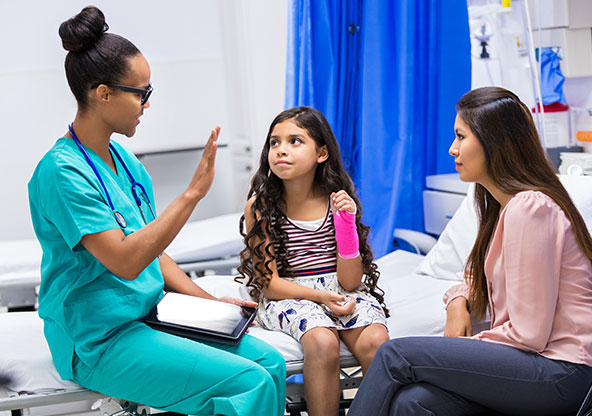8 Reasons To Take Your Child To a Children's ER Instead of a General ER
By Maria Perez-Johnson, D.O.
As a pediatric emergency physician, I am often asked by family and friends when they should go to the emergency room. As a caveat, I often reply whenever you feel you need to go – whether for reassurance of a minor ailment or for a more major emergency. That’s why CHRISTUS Children's has multiple emergency centers just for children that are open 24 hours a day, seven days a week.
We understand that children are not just little adults. In an emergency, they need to see a doctor who treats children. We treat newborns all the way up to age 17.
Adults and children can experience the same symptoms, but for children they could indicate a different or more serious condition. Here are some major and minor instances where you must go directly to your nearest emergency room:
- Any newborn with a fever. This is a special and worrisome time for new babies. Any infant less than 28 days old with a temperature of 100.4 degrees needs medical attention. No matter how you take the baby’s temperature (armpit, forehead, frontal sensors, or rectally), a temperature of 100.4 warrants a complete and emergent assessment by a physician.
- When your child is having difficulty breathing or has abnormal breath sounds like wheezing or stridor. Many kids get these symptoms during the winter and are often associated with viral illnesses like bronchiolitis or croup. These can be quite scary and cause kids to breathe fast. They may start belly breathing or refuse to lie down, preferring to sit up. These are worrisome symptoms and need to be evaluated immediately.
- Any chest pain. Whether from sudden onset or related to trauma, chest pain can be caused by a variety of illnesses. Severe cases of heart disease to minor muscular illnesses can cause distress and must be checked out by a physician to determine that the pain is not a true cardiac illness.
- Any deformity. Kids are resilient and most of the time they bounce back quickly from an injury; however, with any injury where there is an obvious deformity such as swelling or pain they should be seen that same day for assessment of any possible fracture or dislocations.
- Any abnormal or unusual behavior. You are the best gauge of your child’s behavior and demeanor. So if something is not quite right and your child’s behavior is altered from their normal baseline, they need to see a physician for a complete evaluation.
- Any open wound. Lacerations are common for kids after a fall. Facial and extremity lacerations should be repaired the same day to obtain better wound healing. In addition, good cleaning and possible debridement will help to prevent infections.
- Any prolonged vomiting and diarrhea. Infants and toddlers can get dehydrated quickly, so even a few hours to a day of symptoms can make them extremely sick. In addition, anytime these symptoms contain any amount of blood a quick assessment is required. Lack of a good wet diaper or failure to urinate every few hours is a worrisome sign of dehydration for any child.
- Fainting or seizure activity. These symptoms should be assessed by a physician to determine why these episodes occurred. Many times these symptoms are from benign illnesses, but sometimes severe diseases can present with these symptoms.
At CHRISTUS Children's main campus, we have one of the largest emergency departments in the city. Click here to find a pediatric emergency room near you.
Learn more about our emergency services by visiting this page.

